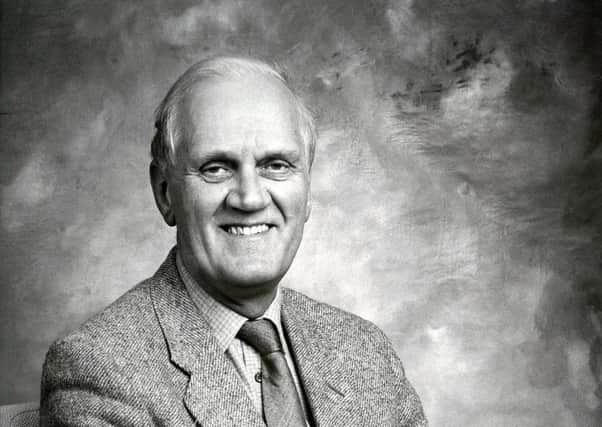Obituary: Professor Jeffrey Collins, electrical engineer and pioneer in analogue signal processing


Professor Jeffrey Collins brought an enthusiastic expertise to the greatly expanding field of surface acoustic wave (SAW) devices at Edinburgh University and showed a canny ability to raise funds for his many academic projects. Collins had the expertise to explain to and enthuse students and potential donors with his lucid demonstrations and explanations of complex problems.
The success of his pioneering vision to establish signal processing at the university is still very much in evidence: a 140-person joint research institute in signal and image processing between the University of Edinburgh and Heriot-Watt University remains the largest such research activity in the UK. It was an outstanding achievement and is Collins’ undoubted legacy.
Advertisement
Hide AdAdvertisement
Hide AdJeffrey Hamilton Collins attended the Royal Grammar School in Guildford and then read mathematics and physics at London University. In the 1940s he worked as a junior technician in the Department of Physics at Guy’s Hospital in London and from 1951-56 he worked in the microwave department for GEC, firstly at Wembley then with Ferranti in Edinburgh.
Collins returned to academia from 1957-66 and was a lecturer and did extensive research at Glasgow University. He continued as a research engineer at the Hansen Experimental Physics Laboratory, Stanford University, where he did valuable work on surface acoustic waves and became a great admirer of America and its people.
He tried to visit all the states – he clocked up 28 – and had miniature flags of those around his house in Edinburgh.
While at Stanford, Collins was one of the founding directors of the Automation and Robotics Research Institute and led the influential research team that developed the UK’s Skynet military communications system.
Eventually, this Skynet receiver synchronised 100 times faster than any existing technology. When the paper was published, a senior official at the Ministry of Defence commented: “I only wish the Russians wrote such clear technical expositions.”
In 1970 he returned to Edinburgh University as the technical director of Microwave and Electronic Systems, where he expanded their commercial capabilities into new radar receiver designs. Such was its success that the company merged with Racal Electronics in 1979 and was awarded the Queen’s Award for Technological Achievement.
Through his own commitment and enthusiasm for the projects the electronics academic staff at the university expanded and the department was awarded the top category in research status in 1998. Collins chaired the University’s Wolfson Microelectronics Institute from 1977-84 which led to a further growth in manpower and the staff rose to more than 400. Collins was an energetic fund raiser and campaigned successfully on behalf of both the Edinburgh Microfabrication Facility and for the new buildings at the Alrick Trust, which housed his growing department.
In 1981 Collins was one of the founding directors who raised £10 million to set up Advent Technology Venture Capital Group to develop in companies creating high-tech products. They invested in Filtronics – a filter device that played a crucial part in safeguarding UK ships during the Falklands War.
Advertisement
Hide AdAdvertisement
Hide AdCollins returned to the US in 1987 and was appointed the founding director of the Automation and Robotics Research Institute at Texas University. The project was largely funded by the Texas legislature and Collins’ ability to motivate the research team proved a vital factor in the ultimate success of the project.
In 1991 Collins returned to Edinburgh and chaired the University of Edinburgh’s Parallel Computing Centre (EPCC). He was instrumental in ensuring that EPCC met its original goals: to accelerate the effective exploitation of novel computing throughout industry, academia and commerce. The centre houses an exceptional range of supercomputers and the organisation is committed to the solution of real-world problems.
The centre attracted the UK National Supercomputing Service in 1994, a service EPCC still runs today using the recently acquired ARCHER and HECTOR supercomputers. At this time Collins encouraged and assisted Stephen Salter and Win Rampen to form the Edinburgh digital hydraulics spin-off company Artemis Intelligent Power, and served as a director until the company was sold to Mitsubishi in 2010.
Collins published widely in learned electrical engineering magazines and his Computer-Aided Design of Surface Acoustic Wave Devices in 1976 was welcomed as a pioneering publication. He was a Fellow of the Royal Society of Edinburgh and awarded an honorary DEng by Edinburgh Napier University in 1997.
Collins was a keen tennis player, and loved music and DIY. He was an ardent supporter of Aldershot United (“in bad times and the not so bad times”), loved watching the FA Cup Final (often journeying to Berwick to watch it in a pub), and attended all the internationals at Murrayfield with gusto.
Professor Collins is survived by his wife, Sally, and their two sons.